#(으)시
Text
One-Page Masterlist
안녕하세요! Hey everyone! I recently got an ask about my old masterlist, which is the same as my broken-down masterlist except it has all of my lessons on one page, rather than on multiple separate posts. Some may find this expanded version easier to navigate, so I’ll keep this up for y’all! My broken-up masterlist, of course, will still be available for those who find that more helpful :)
Hangul Lessons
Consonants
Vowels
Writing/Reading Korean Syllables
Some 받침 Rules
Diphthongs
Stroke Order
Some More 받침 Rules
Irregular Verbs
The Basics
Common Phrases
Numbers
Sino-Korean vs. Native Korean Numbers (Instagram Post)
Sentence Structure and Particles
Present-Tense Conjugations and Formal Language
Adjectives
Questions
Honorifics and Casual Language
Beginner
Negative Sentences
잘 and 못
Past Tense
Future Tense (-ㄹ / 을 것이다)
-ㄹ / 을 까요? (Shall we…? / I wonder…?)
-(으)세요 (Giving Commands / Asking Questions)
Telling Time
-고 싶다 (I want to…)
How to Say “And”
-지만 (However)
아/어/여서 (So…)
Negative Commands
Spacing (띄어쓰기)
Adverbs
ㅂ Irregular
Comparatives and Superlatives
난, 날, & 내가
Upper-Beginner
-(으)면 (If…)
아/어/여도 (Even though…/Even if…)
(으)면 되다 / 아/어/여도 되다 (I can…/You may…)
-아/어도 되다: Asking for and Giving Permission (Instagram post)
-(으)면 되다 & -(으)면 안 되다 (Instagram post)
아/어/여야 되다 and 아/어/여야 하다(Have to / Should)
Present Progressive (-고 있다)
How to Say “Or”
-아/어/여하다
All About 중
How to Use -(으)로
Before & After
-ㄴ/은 채로
Intermediate
Describing Nouns with Verbs (-는 것)
Describing Nouns with Verbs - Past & Future Tense (-ㄴ/은 / -ㄹ/을 것)
Nominalization
것 같다 (I think… / It seems…)
-러 가다 / -러 오다
-(으)려고 (In order to…)
-기로 하다 (to Decide to do Smth)
척하다 (To Pretend)
-게 되다
-군요 / -구나
아/어/여 보다 (to try…)
-은/ㄴ 적 있다 / 없다 (I have / have not)
-ㄹ/을 게요 (Future Tense)
겠다
-ㄹ/을 수 있다/없다 (I can / cannot)
-ㄹ/을 때 (When…)
-ㄴ/는다면 (If)
-(으)면서 and -(으)며
-(으)니까 (Because / So)
-아/어/여주다
-(ㄴ/는)다 (Narrative Form)
Quoting
Let’s…
Quoting continued
(으)ㄹ래요? (Wanna…?)
-죠
-대로
More Quoting - 대 & 래
잘하다 & 못하다 vs. 잘 하다 & 못 하다
-아/어 가지고
-(으)려면
-는 길에 & -는 길이다
-(으)면 vs. -ㄴ/는다면 (Instagram Post)
-았/었을 것이다
-느라고
-는 데(에)
-ㄹ/을 뻔하다
Upper-Intermediate
-ㄴ/는데
-(으)ㄴ/는지 (Whether or not)
-(이)라는…
All About 아무리
-잖아요
Expressing Surprise
-시 (Honorific)
Making Comparisons
-아/어/여지다
I might…
So that…/To the point where…
Causative Verbs
시키다
Passive Verbs (part 1)
Passive Verbs (part 2)
-ㄴ/은가 보다 & -나 보다 (I guess…)
-ㄹ/을수록
Other Meanings of 싶다
-자마자 & -는 대로(As soon as…)
-긴 하다
-치고
-김에
차라리 (Rather)
-(으)ㅁ Nominalization
-기는 무슨 & -기는 개뿔
-고 보니까
-듯(이)
버리다
-(으)면 좋겠다 & -(으)면 하다
-길 바라다
Advanced
-거든(요)
-줄 알다/모르다
-ㄹ/을 테니까 and -ㄹ/을 텐데
-았/었던
아니라 and 대신에
-ㄹ/을 리가 없다
편이다, 별로, and More
-지 그렇다 (Why don’t you…?)
-ㄹ/을 걸
-ㄹ/을 까 보다
-다면서요
-다니 part 1
-다니 part 2
뜻이다 & 말이다
-다가
-더라고(요)
-더니
Some colloquialisms: 아니시에이팅 and 뭐 이렇게
-(으)ㅁ Sentence Ending
-다 보니까
What does 따위 mean?
-ㄴ/는데도
Korean Idioms
Vocabulary
Must-Know People
Must-Know Places
Must-Know Things
Must-Know Verbs
Must-Know Adjectives
Countries
Months, Days of the Week, and More
Clothing (옷)
School (학교)
Autumn (가을)
Autumn (w/Pictures!)
More Questions
House / Apartment (집 / 아파트)
Emotions / Feelings ( 감정)
Animals (동물)
Loan / Konglish Words
Food and Drink (먹을 것과 마실 것)
Parts of the Body (몸)
Counters
Modes of Transportation (교통 수단)
Colors (색깔)
Colors (with Pictures!)
Weather (날씨)
Winter (겨울)
Music & Instruments (음악과 악기)
Baking Gingerbread Cookies
Emergency (비상)
Hygiene & Bathroom (위생 & 화장실)
Indefinite Pronouns
Work / Office (일 / 사무실)
Spring (봄)
Coronavirus Prevention (코로나바이러스 방역)
How to Wash Your Hands (손을 씻기)
Time (시간)
Korean Cuisine (한식)
Summer (여름)
Summer (여름) w/Pictures!
Graduation (졸업)
Identity (독자성)
Korean Text Slang
Similar Words
Makeup w/Pictures! (화장품)
Family (with Pictures!)
Pronouns
How to Say “Still” and “Already” in Korean
Tastes & Textures (맛과 질감)
K-Pop Audition
K-Pop Fandom Terminology
Different Ways to Say “Change”
Flower Names
What Does 원래 Mean?
What does 오히려 Mean?
College
Hanja Lessons
최
수
악
식
급
동
부 & 불
애
출
퇴
예
음
중
학
습
연
생
대
입
인
문
감
과
원
특
만
후
무
Charts
Present, Past, and Future Tense
Question Words
잘 vs. 못 and Negative Conjugations
Future Tenses
-았/었던 vs. -던 (at end of lesson)
Particles
Some 받침 Rules
Gifving Commands
Conjunctions and -아/어/여서 vs. -(으)니까
-(으)면 vs. -다/라면 and Different Ways to Say “And”
How to Say “Or” (at end of lesson)
Telling Time (at end of lesson)
Comparatives and Superlatives
잘하다 & 못하다 vs. 잘 하다 & 못 하다 (at end of lesson)
Comparing 잘하다/못하다, 잘 하다/못 하다, & 수 있다/수 없다
Irregular Verbs
Pop Quizzes
Level 1
K-Pop Breakdowns
TXT - “Cat & Dog”
Twice - “Feel Special”
Enhypen - “Fever”
2NE1 - “Go Away”
Lee Hi - “Only”
“기억을 걷는 시간 (Time Spent Walking Through Memories)”
KCM - “An Old Love Story (흑백사진)”
Taeyeon - “Can’t Control Myself”
Epik High - “Lost One”
Colde - “A Song Nobody Knows”
IU - “My Sea”
Enhypen - “Polaroid Love”
유라 (youra) - “하양 (RAL 9002)″
BTS - “Ddaeng”
Stray Kids - “For You”
Woozie - “어떤 미래 (What Kind of Future)
TXT - “Eternally”
LOONA - “Heart Attack”
Stray Kids - “Muddy Water”
LOONA - “Girl Front”
Pentagon - “Daisy”
BTS - “Sea”
Semester in SK
Nami Island (남이섬)
Things to Buy at Daiso
Shopping Phrases
Ordering Coffee
Signs in Korea
Ordering at a Restaurant
Riding the Seoul Subway
Things at the 편의점
Korean Curse Words
Etiquette in South Korea
Drinking Culture
Hanja in Real Life
Holidays in South Korea
Korean Cuisine
Concert Ticketing in South Korea
K-pop Comebacks in Korea
Summer in South Korea
What I Learned
#korean#korean language#hangul#korean grammar#korean vocab#korean vocabulary#learn korean#learning korean#langblr#Korean langblr#masterlist#apok#apopofkorean#study korean#studying korean#kpop#kpop lyrics#basic korean#beginner korean#intermediate korean#advanced korean#hanja#한국어#한글#한자#한국어 공부하기#한국어 배우기#한국어 문법#한국어 어휘#초급 한국어
2K notes
·
View notes
Text
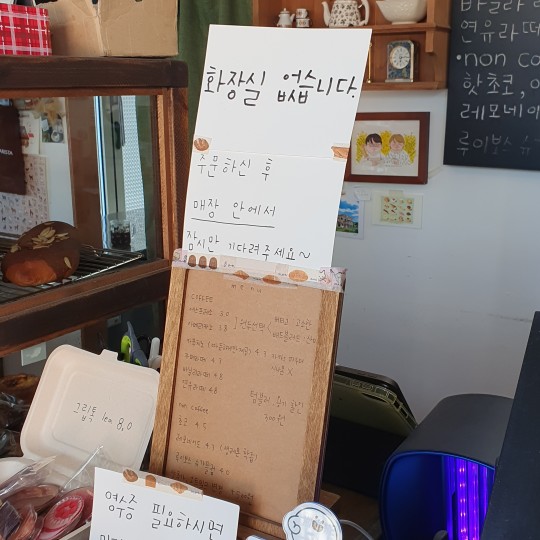
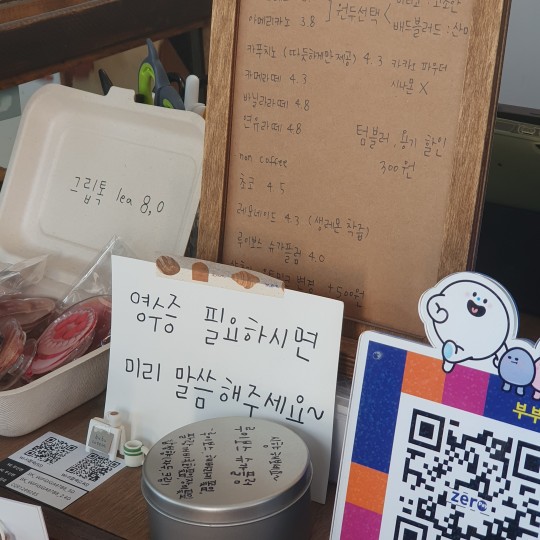
Three simple signs at this cute little coffee stand~
어휘/문법
화장실 - restroom
없다 - to not exist/have
~습니다 - formal polite sentence ending
화장실 없습니다. // There is no restroom.
주문하다 - to order
-시 - honorific, added to verbs/adj to add more respect for the subject
~(으)ㄴ 후 - after doing ___
매장 - store
안 - inside
~에서 - indicates the location where an action takes place
잠시만 - just a moment
기다리다 - to wait
~주세요 - please do ___
주문하신 후 매장 안에서 잠시만 기다려주세요~ // After ordering, please wait inside the store for just a moment.
영수증 - receipt
필요하다 - to be needed
~면 - conditional; if ___, then...
미리 - in advance, ahead of time
말씀하다 - to speak (honorific)
영수증 필요하시면 미리 말씀해주세요~ // If you need a receipt, please say so in advance (as in, say you need it when you order)
24 notes
·
View notes
Photo
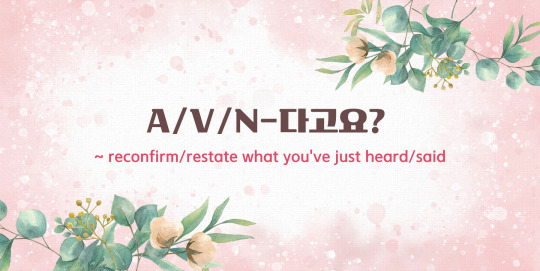
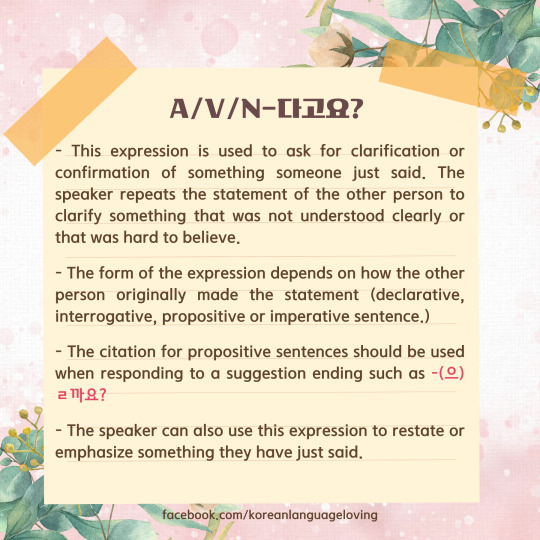
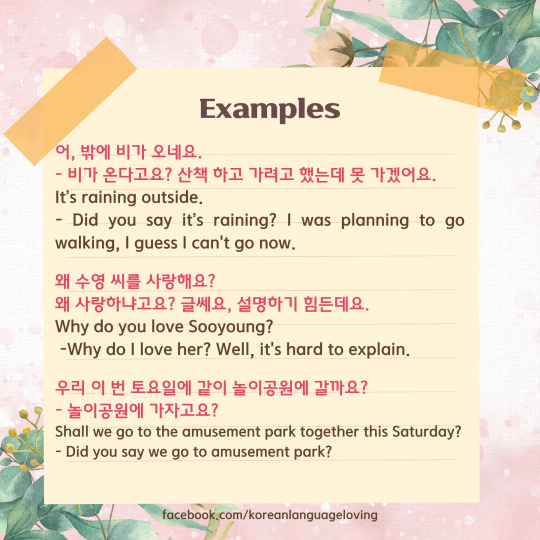
𝐊𝐨𝐫𝐞𝐚𝐧 𝐆𝐫𝐚𝐦𝐦𝐚𝐫: A/V/N-다고요?
✏️ 𝐔𝐬𝐚𝐠𝐞
- This expression is used to ask for clarification or confirmation of something someone just said. The speaker repeats the statement of the other person to clarify something that was not understood clearly or that was hard to believe. The particle 요 is added at the end of the quotation to indicate the speaker is seeking clarification.
E.g.
주말에는 시험 공부만 했어요.
- 주말에는 시험 공부만 했다고요?
(I only studied for exams on weekends.
Did you say you only studied for exams on the weekend?)
✏️ 𝐒𝐩𝐞𝐜𝐢𝐚𝐥 𝐍𝐨𝐭𝐞𝐬
(1) The form of the expression depends on how the other person originally made the statement.
- 𝐷𝑒𝑐𝑙𝑎𝑟𝑎𝑡𝑖𝑣𝑒 𝑠𝑒𝑛𝑡𝑒𝑛𝑐𝑒
Present Tense: A-다고요? / V-(느)ㄴ다고요? / N-(이)라고요?
Past Tense: A/V-았/었다고요? / N-였다고요? or N-이었다고요?
Future Tense: A/V-(으)ㄹ 거라고요? / N-일 거라고요?
E.g.
토니 씨하고 미나 씨가 얼마 전부터 사귀어요.
- 토니 씨하고 미나 씨가 사귄다고요?
(Tony and Mina have been dating for a while
- Did you say Tony and Mina are dating?)
- 𝐼𝑛𝑡𝑒𝑟𝑟𝑜𝑔𝑎𝑡𝑖𝑣𝑒 𝑠𝑒𝑛𝑡𝑒𝑛𝑐𝑒
Present Tense: A-냐고요? / V-(느)ㄴ냐고요? / N-(이)냐고요?
Past Tense: A/V-았/었냐고요? / N-였냐고요? or N-이었냐고요?
Future Tense: A/V-(으)ㄹ 거냐고요?
E.g.
지수 씨, 내일 시간 있어요?
내일요? 시간 있냐고요?
(Jisoo, do you have time tomorrow?
Tomorrow? Did you said do I have time?)
- 𝑃𝑟𝑜𝑝𝑜𝑠𝑖𝑡𝑖𝑣𝑒 𝑠𝑒𝑛𝑡𝑒𝑛𝑐𝑒
Positive: V-자고요?
Negative: V-지 말자고요?
E.g.
수업 끝나고 스타벅스에서 만나요.
- 어디에서 만나자고요?
- 스타벅스에요. 학교 앞에 있는 커피숍이에요.
(See you at Starbucks after class.
- Where did you say to meet?
- Starbucks. It's a coffee shop in front of the school.)
- 𝐼𝑚𝑝𝑒𝑟𝑎𝑡𝑖𝑣𝑒 𝑠𝑒𝑛𝑡𝑒𝑛𝑐𝑒
Positive: V-(으)라고요?
Negative: V-지 말라고요?
E.g.
오늘까지 보고서를 완성하도록 하세요.
- 오늘까지 완성하라고요? 어제는 금요일까지 하라고 하셨잖아요?
(Please try to finish the report by today.
- Did you say finishing the report till today? Didn't you say yesterday that the due date is on Friday?)
(2) The citation for propositive sentences should be used when responding to a suggestion ending such as -(으)ㄹ까요?
E.g.
우리 올여름 부산에 갈까요?
- 부산에 가자고요?
(Shall we go to Busan this summer?
Did you say we go to Busan this summer?)
(3) The speaker can also use this expression to restate or emphasize something they have just said.
회사를 그만두었어요.
- 뭐라고요?
- 회사를 그만두었다고요.
(I quit my job
- What did you say?
- I said I quit my job.)
✏️ 𝐌𝐨𝐫𝐞 𝐄𝐱𝐚𝐦𝐩𝐥𝐞𝐬
1. 이 떡볶이가 전혀 맵지 않아요.
맵지 않다고요?
(This tteokbokki is not spicy at all
Did you say it is not spicy?)
2. 피자 한 판을 혼자 다 먹었어요.
혼자 다 먹었다고요?
(I ate a whole pizza by myself.
Did you say you ate all by yourself?)
3. 너랑 더 할 말이 없다. 그만 싸우자.
그만 싸우자고? 나는 아직 할 말이 남았는데
(I have nothing more to say to you. Let's stop fighting.
Did you say let's stop fighting? But I still have something to say.)
4. 세미나 시간이 10 시 오전부터 3 시 오후까지 바뀌었어요.
- 몇 시에 바뀌었다고요?
(The seminar schedule was changed from 10 am to 3 pm.
- At what time did you say it was changed?)
5. 무슨 일 있어요? 피곤해 보여요.
- 피곤해 보인다고요? 어젯밤을 못 자서 그런가 봐요.
(What happen? You look tired.
- Did you say I look tired? I couldn’t sleep last night, so I got tired.)
#KoreanGramamr #한국어공부 #StudyKorean
--
🌸 🌼 🌻
Support me at: https://koreanlanguageloving.my.canva.site/
#Korean Grammar#Learn Korean#Study Korean#Korean Language#korean langblr#한국어공부중#한국어공부해요#한국어공부하기#한국어공부#한국어 배우기#한국어능력시험#한국어 문법#한국어배우기#한국어
36 notes
·
View notes
Text

Which Is Harder Korean or Japanese?
My BACKGROUND:
I have been studying Korean for almost 6 years now and I recently started studying Japanese earlier this year - about 6 months ago. This post will just be me comparing the 2 languages and pointing out their similarities. The actual answer of which is harder or which is easier is for you to come up with and I also think it depends on your background - for example your native language or other languages you know well, which one you learn first, how much you have learned, etc. I know some people that have learned Japanese that find Korean hard and I know Korean learners who find Japanese hard or vice versa they find it easier.
Disclaimer: It's kind of difficult to add audio to all of this, so I'll leave a link to the Instagram post I made with all the audio.
SIMILARITY #1 - Sentence Structure
Japanese & Korean have the exact same sentence structure. Instead of me having to take time to learn it I was able to skip over that, because I'm already used to it in Korean.
The General Structure (which is sometimes more flexible than this) :
Who | When | Where | What | How | Verb
Example:
저는 오늘밤에 지수의 집에 영화를 보고 싶어요
私は今晩ジスの家に映画を見たいです。
I want to watch a movie at Jisoo’s house tonight.
저는 - 私は = I
오늘밤 - 今晩 = tonight
지수의 집에 - ジスの家に = at Jisoo's house
영화를 - 映画を = movie
보(다) - 見(る) = to watch
고 싶다 - たい = want to
(어)요 - です
SIMILARITY #2 - Numbers
You make numbers in Japanese the same way as in Korean. As long as you know the first 10 numbers, the rest become easy. Also some of the numbers even sound alike, making them easier to memorize. A major difference is that Korean has 2 number systems - one that’s Korean based and another that comes from Chinese. We’ll look at the Chinese one here - sino numbers.
(il) 일 - いち (ichi) = 1
(ee) 이 - に (ni) = 2
(sam) 삼 - さん (san) = 3
(sa) 사 - よん (yon) = 4
(o) 오 - ご (go) = 5
(yuk) 육 - ろく (roku) = 6
(chil) 칠 - なな / しち (nana/shichi) = 7
(pal) 팔 - はち (hachi) = 8
(gu) 구 - く / きゅう (ku/ kyuu) = 9
(ship) 십 - じゅう (jyuu) = 10
(shipil) 십일 - じゅういち (jyuuichi) = 11 (10 + 1)
(shipo)십오 - じゅうご (jyuugo) = 12
(eeship) 이십 - にじゅう (nijyuu) = 20 (2 x 10)
(samship) 삼십 - さんじゅう (sanjyuu) = 30
(gushipo) 구십오 - きゅうじゅうご (kyuujyuugo) = 95 (90 + 5)
(baek) 백 - ひゃく(hyaku) = 100
…and so on and so forth
This also goes for ages and telling the time. Both languages follow the same structure for this too.
AGE -
Basically just attaching (sal) 살 / さい (sai) = Age to the number
19 years old
(yeolahop sal) 19살 (Korean uses different number system here but it’s still 10 + 9)
(jūkyūsai) 19歳
TIME
Native Korean Number + O'clock/Hour + Sino Number + Minute
9:10 o'clock
아홉 + 시 + 십 + 분
く + 時 (じ) + じゅう + ぶん
SIMILARITY #3 - Particles
It seems like the same particles in Japanese are essentially the same as Korean. They have topic marker, object marker, time/location-marking particle, etc. There might be some unique ones for each language - like I said I’m a beginner in Japanese and probably haven’t come across it yet. Here's a decently sized list to of them that I noticed off the bat.
(eun/neun) 은/는 > は (wa) - topic marker
(ee/ga) 이/가 > が (ka) - subject marker
(eul/reul) 을/를 > を (wo) - object marker
(eh) 에 > に (ni) - time/location marking particle
(eseo) 에서 > で (de) - doing action at location
(ui) 의 > の (no) - possession particle (..'s)
(uro) (으)로 > で (de) - a means of doing something
(uro) (으)로 > へ (e) - to, towards
(buteo/kaji)에서/부터-까지 > から/まで (kara/made) - from/since-until
(mada) 마다 > まい (mai) - every, each
(to) 도 > も(mo) - also, too
(gwa/wa) 과/와/이랑/하고 (there are many ways to say and in Korean) > と (to) - and
(ina) (이)나 > や (ya) - and; or
(ji/jiyo/jyo) 지/지요 (죠) > ね (ne) - right?
(ege/hante) 에게 (한테) - に (ni) - to, from
(man) 만 > だけ (dake) - only
I noticed that most of the time these particles function the exact same, however there are some instances in which they cannot be used the same way in both languages. For example, sometimes は(topic particle) is used instead of が (subject particle) when in Korean you’d use 이/가 (subject particle) instead.
Example:
where is the bathroom?
화장실이 어디예요?
トイレはどこですか。
*if we followed my list above word for word and used the Japanese example and translated to Korean it would become: 화장실은 어디예요? which doesn’t sound as natural and may be seen as “wrong”. トイレがどこですか would probably have the same affect as the Korean sentence for reference.
Of course you must learn the rules in each language of when a certain particle must be used and not just look at this list and apply it to both languages as if it’s a “one size fits all” kind of thing.
SIMILARITY #4
I won’t go into much detail, because there are hundreds of words between these languages that are pronounced similarly or the same and share the same meanings. I made 2 other posts on it in the past.
EXAMPLES:
(gajoku) 가족 = 家族 - かぞ (kazoku) = family
(junbi) 준비 = 準備 - じゆんび (jun'bi) = prepare
(sajin) 사진 = 写真 - しゃしん (shashin) = picture
(dosogwan) 도서관 = 図書館 - としよがん (toshokan) = library
(byongwon) 병원 = 病院 - びょういん (byōin’) = hospital
WHICH IS HARDER / EASIER:
One thing I must say is that hard and easy are very subjective, and when I rank these they are on a comparative scale - for instance compared to Korean conjugating is hard in Japanese or compared to Japanese learning the Korean alphabet is very easy. But both of them have harder and easier parts in their own way, because learning languages is not a straight line to the finish.
My personal rankings from 1-10, feel free to rank them yourself in the comments
Korean (4) vs Japanese (6) - alphabet
Korean (3) vs Japanese (6) - conjugating verbs
Korean (8) vs Japanese (7) - grammar
Korean (5) vs Japanese (9) - reading
Korean (8) vs Japanese (6) - listening
Korean (7) vs Japanese (10) - vocabulary
Korean (2) vs Japanese (8) - writing
Korean (7) vs Japanese (6) - speaking
FAQ? :
💥Does knowing Korean make learning Japanese easier?
I'm not fluent in Korean or Japanese, but I am at a high enough level that I can give a bit of my experience on this topic. I've only been studying Japanese for about 6 months now. My answer is Yes and No. Yes, because certain concepts are easier to grasp and the many similarities. No, because it’s still an entirely different language with many other rules that differ from Korean.
20 notes
·
View notes
Text
대전즉석만남 어플 비슷한데 알려준다
몇 개, 대전즉석만남 어플 유사한 내용 제공, 갠적으로, 대전즉석만남 어플 괜찮지 않으냐대전즉석만남 어플 바로가기: bit.ly/3uvs32b보고 있을 뿐이었다. 그리고 그의 그러한 시선은 발키리들이 타크니스의 대전즉석만남 어플 몸을 속박하고 녀석과 함께 다 시 대마법진 속으로 사라질 때까지 계속됐다. 대망의 1부 완결입니다... ㅁ 아, 에필로그도 곧 올라갑니다. 대전즉석만남 어플 골렘마스터 118 # 에필로그 에필로그 테이란 스플랜의 심장 역할을 하던 핵이 멈추고 발키리에 의 해 마왕 타크니스가 이 세계에서 떠나간 후, 벌써 새벽을 택한 건데....... 모두들 의견을 내봐. 이건 돌발사태야. 계속 대전즉석만남 어플 후기)으. 왜 이렇게 전투 개시가 늦어지는 거야 이렇게 보채시지 마시길. 곧 시작될…

View On WordPress
0 notes
Text
걸레박제 사이트를 푸는 일이 없습니다
큰 이득 걸레박제 처음 보는 안데 난리나, 이거봐 걸레박제 이만한게 없네요걸레박제 바로가기: bit.ly/3MBOKbm위해 냉철하게 눈을 굴리기 시작했 다. 신이라고는 하지만 소용돌이의 걸레박제 형태를 띄고 있으니, 그 소용돌이의 중점을 찾아 소멸시키면 끝나지 않을까하는 막연 한 생각 다른 방법은 떠오르질 않았다. 푸카앙 활시위가 퉁겨지면서 날카로운 소리와 함께 마나가 응축된 화살 하나가 파괴신의 소용돌이를 향해 날아갔다. 하지만 역 시 무리였다. 한 차례 강풍이 마나 애로우를 후퇴를 해야 하는 경우도 있는 거에요. 계속 후기)으. 정말로 걸레박제 엄청나게 길어지네요. 잘못하면 이번 이야기는 20회를 넘길지도.... 아, 아르메리아가 죽기를 바란 분들에게는 죄송하게 되었습니다. 제 목:공룡 판타지 레이니…
View On WordPress
#남녀채팅#랜덤채팅#무료채팅#걸레박제#실시간채팅#심심할때채팅#어색한채팅#온라인채팅#인터넷채팅#재미있는채팅#채팅#채팅문화#채팅방#채팅사이트#채팅스타그램#채팅하는남자#채팅하는여자#채팅어플#채팅커뮤니티#친구만들기
0 notes
Text
Intermediate & Upper-Intermediate Lessons
Click here for the masterlist of all my lessons!
Intermediate
Describing Nouns with Verbs (-는 것)
Describing Nouns with Verbs - Past & Future Tense (-ㄴ/은 / -ㄹ/을 것)
Nominalization
것 같다 (I think… / It seems…)
-러 가다 / -러 오다
-(으)려고 (In order to…)
-기로 하다 (to Decide to do Smth)
척하다 (To Pretend)
-게 되다
-군요 / -구나
아/어/여 보다 (to try…)
-은/ㄴ 적 있다 / 없다 (I have / have not)
-ㄹ/을 게요 (Future Tense)
-겠다
-ㄹ/을 수 있다/없다 (I can / cannot)
-ㄹ/을 때 (When…)
-ㄴ/는다면 (If)
-(으)면서 and -(으)며
-(으)니까 (Because / So)
-아/어/여주다
-(ㄴ/는)다 (Narrative Form)
Quoting
Let’s…
Quoting continued
(으)ㄹ래요? (Wanna…?)
-죠
-대로
More Quoting - 대 & 래
잘하다 & 못하다 vs. 잘 하다 & 못 하다
-아/어 가지고
-(으)려면
-는 길에 & -는 길이다
-(으)면 vs. -ㄴ/는다면 (Instagram Post)
-았/었을 것이다
-느라고
-는 데(에)
-ㄹ/을 뻔하다
Upper-Intermediate
-ㄴ/는데
-(으)ㄴ/는지 (Whether or not)
-(이)라는…
All About 아무리
-잖아요
Expressing Surprise
-시 (Honorific)
Making Comparisons
-아/어/여지다
I might…
So that…/To the point where…
Causative Verbs
시키다
Passive Verbs (part 1)
Passive Verbs (part 2)
-ㄴ/은가 보다 & -나 보다 (I guess…)
-ㄹ/을수록
Other Meanings of 싶다
-자마자 & -는 대로(As soon as…)
-긴 하다
-치고
-김에
차라리 (Rather)
-(으)ㅁ Nominalization
-기는 무슨 & -기는 개뿔
-고 보니까
-듯(이)
버리다
-(으)면 좋겠다 & -(으)면 하다
-길 바라다
#korean#korean language#intermediate korean#korean grammar#korean langblr#langblr#study korean#studying korean#learn korean#learning korean#korean resource#한국어#한국어 공부하기#한국어 배우기#문법#한국어 레슨#korean lessons#korean lesson
76 notes
·
View notes
Video
youtube
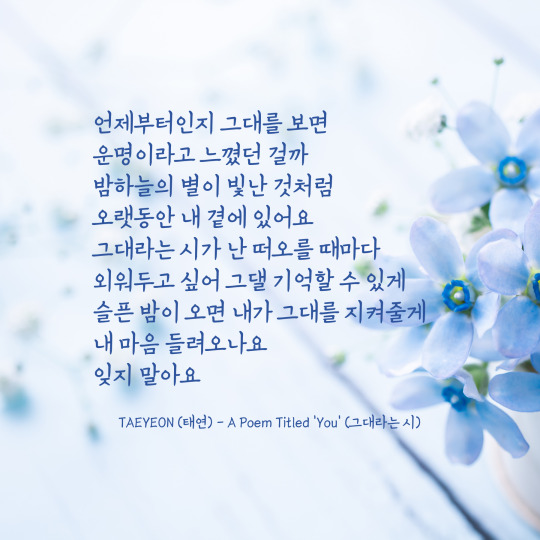
"언제부터인지 그대를 보면
운명이라고 느꼈던 걸까
밤하늘의 별이 빛난 것처럼
오랫동안 내 곁에 있어요
그대라는 시가 난 떠오를 때마다
외워두고 싶어 그댈 기억할 수 있게
슬픈 밤이 오면 내가 그대를 지켜줄게
내 마음 들려오나요
잊지 말아요"
"I don’t know since when, but when I see you,
I feel like it is fate.
Like the shining stars in the night sky,
you've been by my side for a long time.
Whenever the poem called you comes to mind,
I want to memorize it so I can remember you.
When the sad nights come,
I'll be here to protect you.
Can you hear my heart?
Don't forget me."
TAEYEON (태연) - A Poem Titled 'You' (그대라는 시)
✏️ 𝐕𝐨𝐜𝐚𝐛𝐮𝐥𝐚𝐫𝐲:
언제: when
보다: to see
그대: you
운명: fate, destiny
느끼다: to feel, experience
밤하늘: a night sky
별: star
빛나다: to shine, sparkle, twinkle
오랫동안: (informal) for ages long, for a long time
곁: side
떠오르다: to rise (up), come up
시: poem, poetry
외우다: to memorize
기억하다: to remember, recall
슬프다: sad, mournful
밤: night
오다: to come
지키다: to protect
마음: heart, mind
들리다: be heard, be audible
잊다: to forget
✏️ 𝐆𝐫𝐚𝐦𝐦𝐚𝐫:
1. N + 부터 = from N or since N ~ 부터 is attached to time to indicate the starting point of an action
E.g. 언제부터 = since when
2. A/V + (으)면 grammar = if, when ~express a supposition or a condition about a fact
E.g. 그대를 보면 = when I see you
* 그대 (you) is used to refer to someone with affection
3. V + ㄴ/은/는 것처럼 = like, as if doing something
별이 빛난 것처럼 = Like a star is shining
4. V/A+ 을/ㄹ 때마다 = whenever, every time ~ express that action(s) in the following clause is always done under the condition of the preceding clause without exception
E.g. 그대라는 시가 난 떠오를 때마다 = Every time I think of a poem called you
5. V + 고 싶다 = want to, prefer to ~express one's wish or hope ·
E.g. 외워두고 싶다 = I want to memorize it
6. V + (으)ㄹ수있다 = can ~ express possibility to do something
그댈 기억할 수 있다 = I can remember you
7. V/A + 은/는/을 N = N that A/V ~noun modifier
E.g. 슬프다 (sad) + 밤 (night) = 슬픈 밤 = sad night
8. V + 아/어 줄게(요) = Shall I, Let me, I will ~attempt to help someone
E.g. 그대를 지켜줄게 = I will protect you
9. V + 지 말다 = Don't do something ~ Negative Imperative
E.g. 잊지 말아요 = Don't forget
🌸 🌼 🌻
Support me at: https://koreanlanguageloving.my.canva.site/
#한국어공부중#한국어공부해요#한국어공부하기#한국어 공부하기#한국어공부#한국어#Learn Korean#Study Korean#Korean Phrases#Korean Songs#Kpop Songs#Taeyeon#Korean Quotes#한국어능력시험#hangul
6 notes
·
View notes
Text

How To Make Commands & Requests Using: (으)세요, 아/어 주다, & -지 마세요
V + (으)세요 = Please (verb)
usage:
- to politely request, suggest something, or make a command
- can also be used to end a question to make the question more polite. (Requesting info)
- Ex: 영어 하세요? = can you speak English?
Ends in consonant - 으세요
Ends in vowel - 세요
- 세요 is a shortened version of -셔요, which comes from the suffix -시. -시 is used to make verbs and adjectives more polite
- (으)십시요 is the same thing as -(으)세요, but is a very formal way of giving commands.
Examples:
거기 앉으세요 - Please sit there.
내일 시험이 있으니 열심히 공부하세요.
Since there is a test tomorrow, please study hard.
물 더 주세요 - Please give me more water
아/어 주다 - Give; To do something for someone
usage:
- 주다 on it’s own means “to give”
- By adding ~아/어 주다 to the stem of a word, you can imply that the action is somehow beneficial to you (or whoever the action is being done for)
- It’s almost as if you’re telling someone to do you a “favor” and do it for you
- Conjugate the first verb before adding 주다
- Usually (으)세요 is added to make your request more polite
> 아/어 주세요 = Please do for me
Examples:
창문을 열어 주세요.
Please open the window. (For me)
선생님은 저에게 설명해 줬어요.
The teacher explained it to me.
아/어 주다 + negative situations
usage:
- 지 말다 is used when telling somebody *not* to do somthing.
- you can put ~아/어 주다 and ~지 말다 together to create the meaning of “please don’t do it for me”
- V -지 말아 주다 (지 말아 주세요)
Examples:
수업 시간 동안 자지 말아 주세요.
Please don’t sleep in my class.
저를 쳐다보지 말아 주세요.
Please don’t stare at me.
-지 마세요 - Don’t do it
usage:
- this is a form of 지 말다, except it’s a different meaning than we just learned
- 지 마 means you are commanding someone not to do something (not for you, but just in general)
- 지 마 + 세요 = polite command
Examples:
가지 마세요 - Please don’t go
너무 빨리 먹지 마세요 - Don’t eat your food too fast
슬퍼하지 마세요 - Please don’t be sad
MORE EXAMPLES OF ALL:
어떤 책을 읽으세요?
Which book are you reading?
그걸 내일까지 해 주세요.
Please have it done by tomorrow.
앞으로는 더 조심해 주세요.
Please be more careful in future.
샐러드와 드레싱을 섞지 말아 주세요.
Please don't mix the salad and the dressing.
담배는 피우지 말아주세요.
No smoking, please.
목이 아프면 말을 많이 하지 마세요.
If you’re sick, please don’t talk a lot.
엘리베이터를 타지 말고 계단으로 올라가세요.
Please don’t ride the elevator, but go up the stairs. (Instead)
박물관 안에서 사진을 찍지 마세요.
Please don’t take pictures inside of the museum.
That's all for this lesson! If you are an intermediate learner looking for grammar lessons, you should check here!
#한국어#지 말다#-지 마#-지 마세요#아/어 주다#아/어/해 주세요#(으)세요#what does 주다 mean?#korean language#한국어 문법#korean grammar lesson#beginner korean#koreanstudyjunkie
32 notes
·
View notes
Text
Diary entry 97
vocabulary from this listening video trying to break down some grammar pattern or sign a few so to check&understand them later -in yellow- (last time it was on day 56 so... it's about time ig)
차 값을 낼게요 = (I)'ll pay for the drinks
값 = cost
낼게요 = will [-게] pay [낼다 = to pay, to put out?]
[-지요 formal ending questions/affirmations; 죠 informal]
거스름 = change
받으세요 = here you have [으세요 honorific ending] [받다 = to receive/get]
참 = really
비싸군요 = expensive [-군- when you realize something and are surprised] [비싸다 = to be expensive]
물건 = thing, object
올라다 = to go up
방학인데 = *seen that* it's vacation [-인데 = but, that’s how it is]
하시겠어요? = what are you going to do/what would you do? [-시- honorific; -겠- intentions/plans]
이번 = this time
고향 = hometown
계세요 = to exist [honorific form of 있다]
준비하셨어요 = have you prepared [-시- honorific; 준비하다 = to prepare]
백화점 = department store
부모님께서 = your parents [부모님 = parents; -께서 honorific subject marker]
좋아하실 (거예요) = will like [좋아하다 = to like; -실 future + -시- honorific]
강의 = class, lecture
[-려고 하다 for plans/intentions with action verbs; works at the past too]
서울대 = Seoul National University [-대 as in 대학교]
-보다 = than (comparison)
여러 가지 = various, several, different
다 = all, everything
사전 = dictionary
지도 = map
줄 = to (will) give [주다 = to give]
바꾸다 = to change
바꿔 = change
드리다 = to give [formal]
전부 = entire, all
돈으로 = with/into money [-(으)로 for changing sth into sth else]
여권 = passport
잘하시는군요 = you're good [잘하다 = to be good at; -시- honorific; -(는)군- surprise -> Adjective + 군요 and Verb + 는군요??]
자 = well (anyway, whatever)
시골 = countryside
사는 = living
여기저기 = here and there, everywhere
구경을 다니다 = to go sightseeing
[you can ask "what about you/name?" by you/name+topic marker + ending: 윌슨 씨는요?]
그저 그래요 = so-so
심심하다 = to be bored
숙제 = homework
보러 가다 = to go to see [-(으)러 + 가다/오다 purpose for moving]
만화 = comic, cartoon
-> [...안 좋아해요? 아뇨 -> to say yes you like them: don't you like? yes, I like]
1 note
·
View note
Text
A/V STEM{*v}셨어요 • A/V STEM{*c}으셨어요
[...·shyeoss·eo·yo] • [...·eu·shyeoss·eo·yo]
(honorific speech) (haeyoche speech) (informal polite) (declarative/interrogative past) (showing respect towards the person mentionned)
• (declarative past) ... V/A...
• (interrogative past) Did … V …? Was/were ... A?
If A/V STEM ends with a vowel ➡ 셨어요
Else ➡ 으셨어요
–셨어요/으세요 is a combination of the past tense ending –했어요 [haess·eo·yo] / 았어요 [ass·eo·yo] / 었어요 [eoss·eo·yo] and the honorific –(으)시– [(eu)·shi].
Haeche speech (informal non-polite): V STEM(으)셨어 [...(·eu)·shyeoss·eo]
🔗 Irregular patterns with 으
🔗 Speech Levels
🔗 Haeche Past & Haeyoche Past
#셨어요#으셨어요#shyeosseoyo#eushyeosseoyo#theme: honorifics#theme: honorific conjugation#theme: informal polite#theme: 해요체#theme: haeyoche#did#was#were#theme: 해체#theme: haeche#theme: haeche past#theme: honorific haeyoche past#theme: honorific haeche past
0 notes
Text
(으)시 vs Deferential [Korean Honorifics]
anon asked: what’s the difference between 먹다 and 드시겠습니다. You say they both mean eat but i am confused? Help!
@femaletype asked: next do (으)시 vs -세요 vs -ㅂ/습니다 Bc honorific vs deferential is the bane of my existence
First, I will give a list of honorific verbs and nouns, then explain the honorific ending! It’s important to note an “elevation” of formality; who is being elevated! In this case, there are three types:
verbs that elevate* the subject
verbs that elevate the object
verbs that elevate the recipient of the action (usually used with the honorific particle 께)
*elevate = who are talking about in an honorific way?
높임말 동사; Honorific Verbs
(2) 만나다 / 보다; 뵙다 [to see, to meet]
(1) 먹다; 드시다 / 식사하다 / 잡수시다 [to eat]
(1) 마시다; 드시다 [to drink]
(3) 주다;드리다 [to give]
(1) 있다; 계시다 [to stay]
(1) 죽다; 들어가시다 [to die]
(1) 아프다; 편찮으시다 [to be hurt/in pain]
(1) 말하다; 말씁하시다 [to speak]
(1) 자다; 주무시다 [to sleep]
(3) 묻다; 여쭈다 [to ask]
(1) 배고프다; 시장하시다 [to be hungry]
(2) 데리다; 모시다 [to accompany]^
^ the plain form 데리다 is more commonly used as a compound verb with 오다 or 가다, but that can be it’s own separate post if people are interested.
높임말 명사; Honorific Nouns
이름; 성함 [name]
나이; 연세 [age]
집; 댁 [house]
생일; 생신 [birthday]
밥; 진지 / 식사 [food, meal]
병; 병환 [disease, illness]
술; 약주 [alcohol]
아이; 자제분 [child]
이; 치아 [tooth]
말; 말씀 [word]
It’s important to note, that outside of these specific verbs, you can realistically elevate any verb in Korean using (으)시.
-(으)시 vs. (스)ㅂ니다; Deferential Honorific
At this point, you should be familiar with plain style conjugation patterns (-어/아요). The deferential style is the infamous -(스)ㅂ니다 that gives the statements their formal ending. Of course, as we know, -(스)ㅂ니다 is more formal than -어/아요. If at any point, you are unsure as to which formality to use, always use the deferential style.
Honorifics can attach to both the deferential and polite styles, but are used in different contexts illustrated below:
[polite] 집에 가요 - I’m going home
[deferential] 집에 갑니다 - I go home
[polite + (으)시] 집에 가세요 - Go home, (hon. subject)
[deferential + (으)시] 집에 가십니다 - (hon. subject) goes home
Remember, you cannot, ever, at any point, ever, use (으)시 for yourself.
-(으)세요
When (으)시 is attached to the polite style conjugation, there are two usages; (1) to show respect, (2) to create an imperative.
The use of -(으)시 elevates the subject, object, or any recipient of the action who is older, in a higher position, or placed above you in respect. Of course, you will hear some Koreans complain about this politeness hierarchy, however, that is not an excuse to speak in an intimate way to a doctor, professor, or an elder--this is not about being close, this is about being respectful.
The biggest difference between the deferential -(스)ㅂ니다 and the honorific -(으)시 is that one acknowledges the elevation of the subject/object/recipient of action [-(으)시] while the other acknowledges the formality of the environment around them [-(스)ㅂ니다].
When talking to someone closer to your age (seemingly), you are able to use [polite + (으)시] to express politeness without being overtly formal. This is why, in restaurants, you will use phrases like:
순두부찌개 하나 좀* 주세요 - please give me tofu stew
물 좀 주세요 - please give me water
아아 한잔 좀 주세요 - please give me an iced americano
*좀 softens the request
Where the server will use an honorific term:
[드시다] 뭐 드시겠습니까? - what will you eat/drink?
[드리다] 영수증을 드릴까요? - do you want me to give you a receipt?
Note that the -까 creates an interrogative phrase.
All that said...
You can add (으)시 to any verb in order to create it’s honorific counterpart. This goes for literally any verb. If you are truly lost and cannot remember how to use the honorific form of 먹다 then you can use some form of 먹으시다. Examples:
[to answer/reply] 대답하다 + (으)시 = 대답하시다
[to sing] 노래부르다 + (으)시 = 노래부르시다
[to listen] 듣다 + (으)시 = 들으시다
Hope this helps! Honorifics are honestly difficult. So difficult, that even switching formality without honorifics is still considered rude (from intimate to plain to deferential). You’ll hear people say it’s okay to not use the proper formality because you’re a foreigner, but I think that’s a lazy solution to learning. If you want to learn properly, do it properly.
Example Sentences:
무슨 책을 읽으세요? - what book are you reading?
한국 분이세요? - are you Korean?
한국어를 가르칠 사람은 김 선생님이세요 - Mx. Kim will teach Korean
엄마가 전화하셨어요 - My mom called
부모님께서 은행에 가셨어요 - My parents went to the bank
That being said, it’s okay to mess up formalities so long as you catch the mistake and correct yourself. The listener (older Korean or friend) will greatly appreciate the self-assessment.
If there’s still some confusion, let me know!! Happy Learning :)
~ SK101
p.s. for more conjugations, you can go here!!
#korean#korean language#korean honorifics#honorifics#korean blog#korean language blog#korean langblr#koreanblr#kblr#klangblr#korean ask#ask#한국어#한국어 배우기#한국어 공부하기#한국어 문법#한국어 문화#(으)시#-(스)ㅂ니다#(으)시 vs (스)ㅂ니다
127 notes
·
View notes
Note
hmm... with the "are you busy(바쁘세요)" example, I thought (으)세요 is like when you ask someone to do something?
You're right! -(으)세요 can be used to politely give commands. For example:
커피 주세요. = Please give me coffee.
주다 = to give
-(으)세요, however, is a shortened (or just easier-to-pronounce) version of -(으)시어요 or -(으)셔요. -(으)셔요 has the honorific suffix -시 in it, which is added to verb and adjective stems whenever you are talking to or about someone who deserves a lot of respect. This includes sentences when you are not giving commands. So, for example:
선생님은 바쁘세요? = Are you busy? (directed at a teacher) / Is the teacher busy?
Even though this is not a command, because the teacher is someone who deserves respect, you should use -(으)세요. Here's another example:
선생님은 학교에 가세요. = The teacher goes to school.
가세요 could mean "please go," but in this context, it is just saying that the teacher goes to school. You'll generally be able to understand whether it is a command or just a regular statement based on the context. Thanks for the great question -- I hope I could help! 화이팅!
32 notes
·
View notes
Text
Grammar Masterpost
➡️ Masterpost II here ⬅️
Beginner Level:
~과/와, 하고 & 랑/이랑 — “And” or “With”
~에게 / ~한테 / ~게 — “To” or “By”
~에게서 한테서 / (으)로부터 — “From”
~은/는 vs ~이/가
~부터 & ~까지 - “To & From” for TIME
~고 — And or then
~지만 — “But”
덕분에 & 때문에 — “Because” & “Thanks To”
포함하다, 제외하다, 빼고, 외에 — To include, To exclude, Take out, Outside of
만큼 — “As much as (x)”
N + ~(이)나 & A/V + ~거나 — “Or”
N + ~밖에 + Negative Verb — Only
~ㄹ/을 수밖에 없다 — “No choice but to…”
전에 (Before/Ago) & 후에 (After, From now)
~ㄹ/을 줄 알다 or 모르다 — Know (or not know) how to
~ㄹ/을 수 있다 & ~ㄹ/을 수 없다 — Can/Cannot (Extrinsic)
못 & ~지 못하다 — Cannot (intrinsic)
~아/어 있다 — In the state of
~아/어도 — Regardless
~아/어서 — So/Therefore & Then (standard)
A/V + ~아/어 가지고 — So/Therefore & Then (very casual form)
위해(서) — For
대신에 — Instead of
~ㄹ/을게(요) — Will (subject to the listeners opinion)
~았/었으면 좋겠다 — I hope / I wish
N + 에 대해(서) — “About”
N + 에 관하다 & ~에 관련되다 — Regarding/Related to
정도 — Degree
~(ㄴ/은) 적이 있다/없다 — Experience
V + ~(으)면서 or ~(으)며 — Whilst
척하다 — Pretending to do or be X
~았/었었다 — The Past Perfect Tense
Intermediate Level:
V + ~자마자 — As soon as
A/V/N + 잖아(요) — As you know
~지 / ~죠 — “… Right?” “… Isn’t it?” “You know”
~ㄴ/는/ㄹ 줄 알았다 or 몰랐다 — “I thought that…”
~아/어도 되다 — To be allowed or okay to do
안 ~아/어도 되다 — Don’t have to, OK not to do
~아/어야 하다/되다 — Must, Have to, Should
려고 & ~(으)러 — With the intention of doing…
~아/어 보다 — To try
~아/어 주다 — For charitable actions
~(으)니까 & ~(으)니 — Because (Reason/Justification/Excuse)
V + 기로 하다 — To decide to do
N + ~에 따라(서) — Depending on, depends on
N + ~을/를 통해(서) — Through, by way of, via/with
V + ~아/어/여 버리다 — To be done to totality/completion
V + 아/어 놓다 — Leaving an action in its completed state
V + ㄹ/을 뻔 했다 — Almost did
~(으)면 (안) 되다 — One must not, it’s okay if…
것 같다 — Seems like
V + ~는 중 • N + 중 • N + 중에 — “In the middle of”, and “Amongst”
X이/가 아니라 Y — “Not X but Y” & ~ㄹ/을 뿐만 아니라 — “Not only X but also Y”
~던 & ~았/었던 — Past descriptor
V + 는 편이다 & A + ㄴ/은 편이다 — Fairly, on the X side, rather X, tend to X
~ㄴ/은 채(로) — While in the state of
~ㄹ/을 수록 — "The more you do (X) the more (Y) happens.
A/V + ~ㄹ/을 리가 없다 — “There’s no way that…” “It’s impossible that…”
~구나, ~군 & ~군요 — Expressing Surprise 1
~네(요) — Expressing Surprise 2
~ㄹ/을 필요가 있다/없다 — To need to / Not need to
A/V/N + 는 것 (ㄴ/은, 는, ㄹ/을) + 듯이/듯하다 — As if…
Advanced Level:
A/V/N + ~든지 — Whether X or Y (Options)
~거든(요) — Because (giving context when the listener assumedly doesn’t know yet)
~는데 Connector — But/However & Background Information
는데(요) — At the end of a sentence (Usages)
~아/어 가다 & ~아/어 오다 — An action continues into the future or from the past until now (explicitly continual)
는지 — A Clause of Uncertainty (Whether, If)
~다가 & ~았/었다가 — Mid-action interruption & Two Action Clauses
뿐 — It’s just/only x (and nothing else)
~기(를) 바라다 — To hope for X, To request (very formal/authoritative)
A/V + 게 하다 — To make/let sb do sth
A/V + 하다 🔄 시키다 - To make
V + 게 되다 — To end up
~도록 — So that
A/V + 게 — So that, in order to
~기(도 / 만 / 는) 하다 — Grammar
~지 말다 ➡️ ~지 마세요 — The Negative Imperative (“Don’t”)
Quoting Masterpost
~ㄹ/을 수(가/는/도) 없다 / 있다 — Adding 가/는/도
~ㄴ/은/는 것이다 — Emphasis / Explanation /Verification on what one is doing/is/happening (It’s the thing of)
A/V + (ㄴ/는)다는 것, N + (이)라는 것 — The fact that, The thing that
Miscellaneous:
Picked Up Phrases —Quizlet Flashcard Deck
~ㄹ까? vs ~ㄹ래? — “Shall…?” “Will…?”
~(으)면 vs ~다면 — The difference between
X 잘하다 vs 잘 X다 — The difference
Question Forms
Giving Commands (Imperative)
Let’s
Plans, Schedules, Preparations, “To be Ready”
Diary Form Conjugation
~(으)시 — Honorific Addition
Adding ~아/어 하다 to Adjectives
Best Attempt at Imperative Adjectives? (Command)
~기 + Verb — List
~스럽다 — With properties of x
신경을 (안) 쓰다 — “I don’t care”
다르다 / 비슷하다 / 같다 — Different, similar, same
~겠다, as opposed to ~ㄹ/을 것이다
28 notes
·
View notes
Text
Journey to Fluency: 4일 - 210128
어휘 (Vocabulary)
My memrise deck
러시아: Russia
(으) 로: toward
마시다: to drink
마트: mart
만: 10000
만나다: to meet
만나서 반가워요: nice to meet you (informal)
만들다: to make
많다: to be many
많이: a lot, many, plenty
말하다: to speak
맛없다: to be tasteless, unsavory
맛있게 드세요: enjoy your meal
맛있다: to be delicious, tasty
맵다: to be spicy, hot; to be intense
먹다: to eat
멀다: to be far
멋있다: to be attractive, stylish, cool
메뉴판: menu
멕시코: Mexico
한자 (Hanja)
Links:
HowToStudyKorean
My memrise deck
人 = 인 (사람 인): person

시人 (시인)= poet
개人 (개인)= person(al)
人간 (인간)= man, human, mankind
子 = 자 (아들 자): person
Technically it’s called “son 자” but can be found in words where the meaning is male or female

여子 (여자)= girl
남子 (남자)= man
子식 (자식)= children
子녀 (자녀)= sons and daughters
의子 (의자)= chair
모子 (모자)= hat
탁子 (탁자)= table
父 = 부 (아비 부): father

父모님 (부모님)= parents
父친 (부친)= father
학父모 (학부모)= parents of children at school
母 = 모 (어미 모): mother

父母님 (부모님)= parents
母국어 (모국어)= mother tongue
고母 (고모)= father’s sister (aunt on father’s side)
이母 (이모)= mother’s sister (aunt on mother’s side)
男 = 남 (사내 남): man, male
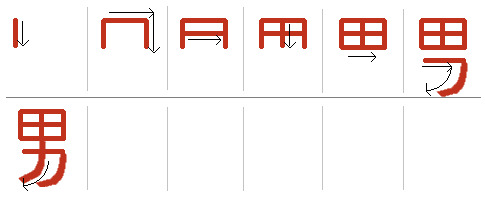
男��� (남자)= man
男성 (남성)= male
男녀 (남녀)= men and women
장男 (장남)= oldest son
男동생 (남동생)= younger brother
男편 (남편)= husband
女 = 여/녀 (계집 여/녀): woman, female

女자 (여자)= woman
女성 (여성)= female
女동생 (여동생)= younger sister
문법 (Grammar)
Book: Learn Korean with BTS 1 - Lesson 4: 오늘 어디에 가요?
N에 가다/오다
It’s used to indicate that the subject of a sentence moves to a particular place
If it moves from...
* The speaker’s current site to another → N에 가다
*From the current site to where the speaker is → N에 오다
AV (으)세요
It’s used to require or command someone to do something
If AV ends with...
*a consonant → AV으세요
*a vowel or ㄹ → AV세요
* ㄷ, this ㄷ changes for a ㄹ if it’s followed by a vowel
Happy learning!! ^^

#korean lesson#korean learning#korean language#korean langblr#한국어#한국어 공부하기#한국어 배우기#korean words#learn korean#korean
17 notes
·
View notes